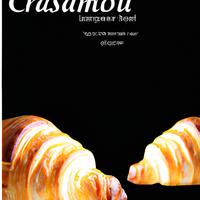
1 serving (57 grams) contains 231 calories, 4.0 grams of protein, 12.0 grams of fat, and 26.0 grams of carbohydrates.

Log this food in SnapCalorie

Nutrition Information
Calories |
962.5 | ||
|---|---|---|---|
% Daily Value* |
|||
| Total Fat | 50.0 g | 64% | |
| Saturated Fat | 29.2 g | 146% | |
| Polyunsaturated Fat | 0 g | ||
| Cholesterol | 125.0 mg | 41% | |
| Sodium | 875.0 mg | 38% | |
| Total Carbohydrates | 108.3 g | 39% | |
| Dietary Fiber | 4.2 g | 15% | |
| Sugars | 16.7 g | ||
| protein | 16.7 g | 33% | |
| Vitamin D | 0 mcg | 0% | |
| Calcium | 83.3 mg | 6% | |
| Iron | 5.0 mg | 27% | |
| Potassium | 250.0 mg | 5% | |
* Percent Daily Values are based on a 2,000 calorie diet. Your daily values may be higher or lower depending on your calorie needs.
Food Attributes
Source of Calories
About Crossant
A croissant is a buttery, flaky, crescent-shaped pastry originating from France, though its roots are tied to Austrian cuisine. Made with layers of dough and butter, it undergoes a meticulous process of folding and rolling to achieve its signature airy texture. Ingredients typically include flour, butter, sugar, yeast, milk, and salt. While croissants are beloved for their rich, indulgent taste, their nutritional profile leans toward being a treat rather than a health food. They are high in calories and saturated fats due to their butter content, but they also provide quick energy from carbohydrates. Pairing a croissant with protein or fiber-rich foods, such as eggs or fruit, can help balance its nutritional impact. Best enjoyed in moderation, this iconic pastry remains a staple of French cuisine, celebrated for its flavor and craftsmanship.



